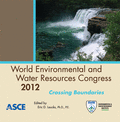International Perspective of Water Resources Planning and Management in 2050
Publication: World Environmental and Water Resources Congress 2012: Crossing Boundaries
Abstract
This paper focuses on the future sate of water resource planning and management. A 2050 vision on water resources is on how to keep up with fields' technological breakthrough in information technology, sensors, networking communication technologies and improving standards of living. Growth of populations, high demands of water, decreasing water resources hydrological variables due to climate change, declining levels of groundwater, pollution, and ever-growing financial predicaments are stumbling blocks to keeping paste with technological, social and economic changes. Increasing energy costs, decreasing yields, debt, unemployment, conflicts and water wars are the possible future stakes. The inter-basin agreements based on actual water value and equitable shares can be the means to avoid the water wars and resolve the conflict of interests by sharing the benefits created by water. Visions of 2050 water resources management are based on more on science and technology and less on arbitrary political decisions Developing decision support systems (DSS) and shared vision on the water benefits, earth observation and remote sensing, data storage and information management and more public awareness and stockholders contributing in Integrated Water Resources Management (IWRM) projects implementations are the development changes for 2050. Furthermore, the advances in engineering education have an important role in society developments, and developing countries are catching up an acceptable pace. Improving the learning science and technology are required to develop practitioners capable of developing and implementing the new ideas against historical barriers. Water resource engineers should be trained to use the strategic approach encompasses "big picture" thinking and planning. This thinking addresses principal issues, structure, organization, and primary objectives utilizing horizontal thinking. In water and environmental management, the parallel thinking or holistic paradigm emphasize on system management in an integrated fashion. Universities around the world will revise their water-related research and education programs to graduate students who are qualified to familiar with the multitude of disciplines such as communication, ecology, economics, engineering, geography, governance, hydrology, law, planning, policy sciences, and more. The university programs will engage students in virtual learning and lifelong learning of interdisciplinary subjects addressing the emerging challenging in water and environmental engineering, planning and management.
Get full access to this article
View all available purchase options and get full access to this chapter.
Information & Authors
Information
Published In
Copyright
© 2012 American Society of Civil Engineers.
History
Published online: Jul 11, 2012
ASCE Technical Topics:
- Bodies of water (by type)
- Education
- Engineering education
- Freight transportation
- Hydration
- Infrastructure
- International waters
- Laminating
- Logistics
- Materials engineering
- Materials processing
- Practice and Profession
- Resource management
- Seas and oceans
- Transportation engineering
- Water and water resources
- Water management
- Water policy
- Water resources
- Water storage
- Water supply
- Water supply systems
Authors
Metrics & Citations
Metrics
Citations
Download citation
If you have the appropriate software installed, you can download article citation data to the citation manager of your choice. Simply select your manager software from the list below and click Download.
